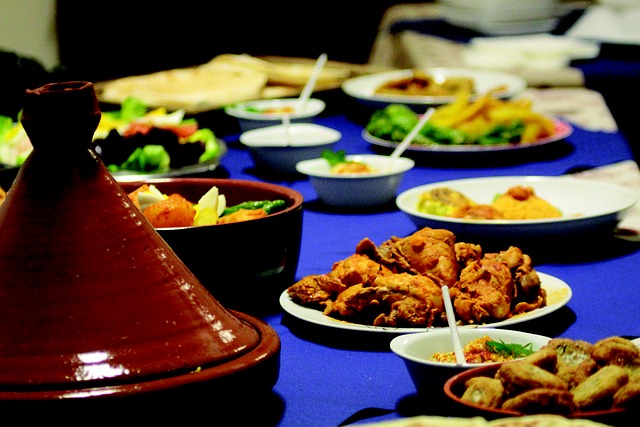7 areas to look at that make or break a cross-cultural relationship
I always thought (and I still think) that there is a certain magic in cross-cultural relationships. I mean, with all the different things to learn from each other, you can never get bored and there is always something to talk and laugh about, isn’t it?!
Exploring the world by forming cross-cultural relationships
In this article, I want to talk about the benefits of a cross-cultural relationship as well as the things that you need to be aware of when entering a relationship with someone from another culture. To make it easier for you, I included a rating „potential for conflict“ at the end of each topic to quickly grasp the areas you need to have a closer look at what can make or break your relationship.
We are all the same – no matter where we come from
As probably each of you readers, I love to travel. Getting to know the unknown. To learn a foreign language, taste new food and take over some of the daily habits and beliefs that form the foreign culture and peoples realities. I believe that, no matter where we live, we are all the same. We all want to be respected, loved and live a healthy life and have enough financial resources to have a roof over our head and provide for our loved ones.
Therefore, every once in a while, I go on a quest to „discover all the similarities in our differences“. This has been my motto ever since I came from my first backpacking trip 2010 to India and Nepal. It also guided me through the relationships and friendships I’ve had with people from other countries and other cultures. What I’ve learned from those? Let’s see.
Be aware: I talk about personal experiences and share my own opinion. I know that you can’t judge a whole culture by what you’ve experienced with a few individuals. Still, I believe in some form of stereotypes but that doesn’t go without making my own experiences. So, I recommend you: Go out and travel, because the most dangerous worldview is the one, of people who’ve never seen the world.
1. Food & Music
This is probably the most exciting and also the most easiest area to adapt to another culture. I find it very interesting to listen to the national radio of a country and get to know new styles of music. It gives you very quickly an idea of the basic mood in the country. For example, in Brazil you hear a lot of Forró music. The rhythm is short, rather frantic and in general very happy – as the Brazil in general are: Very open and approaching everyone fearlessly with a happy mood.
In Portugal people speak the same language, use the same vocabulary but the Fado which you hear f. e. in some bars of Lisbon couldn’t be more different to it: It sounds rather melodramatic and less intrusive than the Forró in Brazil. Compared to Brazilian people, Portuguese are quieter when approaching a stranger, still very friendly but I think they are in general very modest people.

Source: https://pixabay.com/de/marokko-tajine-eintopf-lebensmittel-325324/
When it comes to food, I like to taste what I can’t get at home. For example, I very much like the taste of sweet and salty together, like the Moroccan tajine of chicken and lemon, garnished with raisins and cinnamon.
But what I enjoy even more is to learn other eating habits. To observe: What do others eat for breakfast? When do they eat it? Do they take it at home or in a bar on the go? Do they drink alcohol at lunch? When do they take their dinner? Do they eat with the hand or with sticks or with knife and fork?
In the relationships I had, I was always curious and tried even the strange looking food. Of course not all was my taste. But when it comes to food, it is just very easy to neglect and look for something else.
Potential for conflict: – – –
2. Family & Relatives
In arab cultures it is common to ask after the parents and siblings when you meet your friend. This can already give you an idea of how important the role of the family is when it comes to life-changing decisions such as marriage and having kids. The family wants to have a voice here. And the child, your partner, is often conflicted with the view that they’ve got from their parents and the one that they’ve experienced themselves, especially when your partner was born in or got his or her education in another country and culture than the parents.
Therefore, it is always a good idea to get to know the parents early and not to hide your loved one to each others parents. If your relationship is not respected by either one of your parents, you can get into serious pain and you have to think about wisely if there is a chance for you two to build a life with each other or not.
Potential for conflict: + + +
3. Personal distance and intimate touch
Did you ever have to queue in another country when waiting for the bus or standing in front of the ticket counter? Depending on were you grew up, you might feel a little discomfort when someone stands right behind you or not. It differs from culture to culture how little distance is accepted as normal and not feeling intimidating. Most times, you can already gather some information from that of how much intimate touch is usual in that culture.

For example: How do they greet each other? With kisses? How much? How often do they hug? Do they touch each others faces? As long as you and your partner are not totally differently wired, I see this as an area with little potential for conflict. Rather, I think this is a good area for compromise to fulfill your partners’ needs.
Potential for conflict: – –
4. Traveling together
It is a lot of fun to travel together the world (that’s what we’re all here for, aren’t we?!). I think nothing can bring you closer or farther apart from each other than being with someone you love 24/7 in the unknown, even dangerous or simply very fun and exciting situations. Your patience is tested all the time. How does the other react when things are not working as planned? Is the other picky when it comes to choosing accommodation and places to eat? Does he or she like to spent all the money mindlessly or to tight on a budget that enjoying is almost impossible?
There is also another area for conflict: As a German, I am aware that I have the most powerful passport in the world. I can stay in a lot of countries for at least 90 days without the need of applying for a visa. If I need to apply, I haven’t experienced any trouble yet. I am thankful for this opportunity and at the same time I know this is a potential for conflict when it comes to making travel plans with another who doesn’t have this freedom. You may have to take some holidays alone.
Potential for conflict: + +
5. Work and the culture
When you meet a German, the second question after you’ve been asked for your name is „What do you do for a living?“ – something I have never experienced in another country. It is as in Germany you are defined by what you do. There is also a word; „Leistungsgesellschaft“ (engl.: meritocracy), which describes that we are a folk that works a lot to prove that we are worthy – sometimes maybe more than it was necessary. It often seems to me, that other cultures, especially the ones in southern Europe or in Southern America, have a lot more „healthy“ approach to work. But I am not sure.
I see that Germans can come into work at 8 a.m. and end it at 5 p.m. I have never heard that of southern countries, except from traditional industries such as banks or from people who work for the state. In the contrary, elsewhere I observed that people may spent more time chatting but also have to stay longer and finish work late. This also affects your relationship of course. How much time is left after work to share quality time with each other? As a freelancer, you don’t have to worry so much since you alone are responsible for your time. But when being employed, it is at least a point to talk about in order to make the most of your time when living together.
Potential for conflict: +
6. Religion

Some religions allow you as a man or woman to marry someone from another religion, some forbid it and make it a requirement that one converts to the other. I would recommend you and your partner to clarify your point of view from the early beginning. It is an area that can make or break your potential future and is rarely something that changes with time – there are just no grey lines.
Potential for conflict: + + +
7. A culture of individuality vs. community
I still remember very well the first day of my exchange semester in Finland. During the opening session, the teacher gave us the task to build a row in order to find out who comes from a rather individual culture and who is more used to community and solidarity. Finnish people, followed by the German, built the end of the row at one side, and the African people built the other end of the row. In between were people from Turkey, Spain, Italy, South Korea, Lithuania, Sweden (not in that exact order). In my whole exchange semester I experienced, that even if a lot of us are European, we are still so different. And I guess, the more developed a country is, the more it can afford to be individual.
Whereas in some cultures it is normal to live in your parents house until you marry, in others it is used to move out as early as you can provide for yourself. In Germany, you wouldn’t expect to dinner every day with the parents of one another whereas in other countries, the new partner becomes like a member of the family early on and belongings and food are shared with everyone. If I would draw a black and white picture of the general differences, I would say that in northern Europe we are more a „help yourself“ society whereas in other societies I experienced more a culture where you ask yourself „how can I help the other“. There may be a little potential for conflict when you come from different backgrounds, but I would say it is also the area were you have to most potential to grow to a better person.
Potential for conflict: +
My conclusion
To summarize, I would say a cross-cultural relationship is always worth a try. Even if it wont’t last forever, it is guaranteed that you will learn something about yourself and hopefully become a better person. There are things that need to be discussed and can be a non-negotiable. But when you are aware of them and bring up the topic in the early beginnings, you can prevent a lot of misunderstandings and frustration. In the end, a relationship with someone from another culture can be closer and more intimate with someone from your home. As in any other relationship, it comes down to how you treat each other and how much respect you show for each others differences.
You can meet me in Bansko at the Nomad Soulmates retreat where I’m more going into depth about cross culture relationships and love languages in general.
What is your experience with cross-cultural relationships? I’d love to know (write it in the comments below).
 Ute works as a Content Strategist and is her own boss at contentwerk. She believes that everyone has a gift and teaches the people how to communicate it well through the different channels in the right format and at the right time. Connect with Ute through her instagram.
Ute works as a Content Strategist and is her own boss at contentwerk. She believes that everyone has a gift and teaches the people how to communicate it well through the different channels in the right format and at the right time. Connect with Ute through her instagram.
Join our Nomad Soulmates Winter retreat in Bulgaria
Learn how you can make meaningful connections as a digital nomad and join a bunch digital nomads for a winter retreat in the mountains in Bansko (Bulgaria).
Meet 9901 Nomads for online dating at our Facebook Group
We are running a Free Closed Facebook Group for single location independent people who would like to make better, more meaningful connections with other like-minded people around the world. Join and meet up for adventurous activities! Who knows, maybe you are bumping into your Soulmate?!






Leave a Reply
Want to join the discussion?Feel free to contribute!